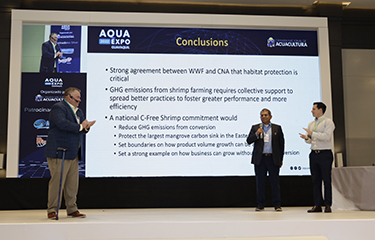The Ecuadorian branch of the World Wildlife Fund (WWF) and Ecuador’s National Chamber of Aquaculture (CNA) have signed an agreement that looks to halt the conversion of natural habitat to accommodate shrimp farming in the country.
The agreement marks the first national commitment for conversion-free aquaculture from any country in the world, according to the two entities. Under this arrangement, Worcester, Massachusetts, U.S.A.-based Clark Labs will generate geospatial data for WWF-Ecuador and CNA to analyze and classify land cover in coastal regions where shrimp farming is most common. CNA can then use this research and data to set a baseline founded on scientific evidence, repeating the analysis yearly with the goal of reducing and ultimately ending all land conversion for shrimp farming in the country, they said.
The country has sizeable mangrove forests, but surging worldwide demand for shrimp and the resulting increased aquaculture activity have put pressure on coastal habitat and wetland areas, WWF said.
Ecuador's shrimp exports exceeded its banana exports as the country's leading non-oil export for the first time in 2017, valued at just over USD 2.5 billion (EUR 2.5 billion). According to the latest yearly figures from CNA, by 2021 that figure doubled, reaching USD 5.08 billion (EUR 5.2 billion) in shrimp export value, far surpassing the previous annual record set in 2020 of USD 3.6 billion (EUR 3.7 billion). The country also broke its volume record in 2021, producing 1.86 billion pounds of shrimp, up 24 percent compared to the previous record of 1.49 billion pounds, set in 2020.
In light of that rapid industrial expansion, the CNA and WWF saw a need to ensure sustainable development.
“It is time for a change in the way we produce commodities such as shrimp, in a more environmentally friendly way, particularly respecting mangroves, and not contributing to their degradation. A large sector of the shrimp industry is now committed to moving towards more sustainable production and organizations like WWF are here to help make that happen,” WWF-Ecuador Country Director Tarsicio Granizo said, highlighting the need to ensure biodiversity and the nation’s natural ecosystems remain intact.
The CNA has been working for years to establish the sustainability and trustworthiness of its farmed shrimp industry. The CNA’s first formal exercise, initiated five years ago, was the foundation of the Sustainable Shrimp Partnership. The platform is global, but thus far the sustainability program's only certified farms are in Ecuador.
“The Ecuadorian shrimp sector has been characterized as an industry that cares for the environment and protects the surrounding ecosystems,” CNA Executive President Jose Antonio Camposano said. “This agreement will allow us to further strengthen our industry's commitment to the conservation of ecosystems as valuable as mangrove forests, and serve as an example for other industries in Ecuador and worldwide.”
Photo courtesy of Ecuador’s National Chamber of Aquaculture







